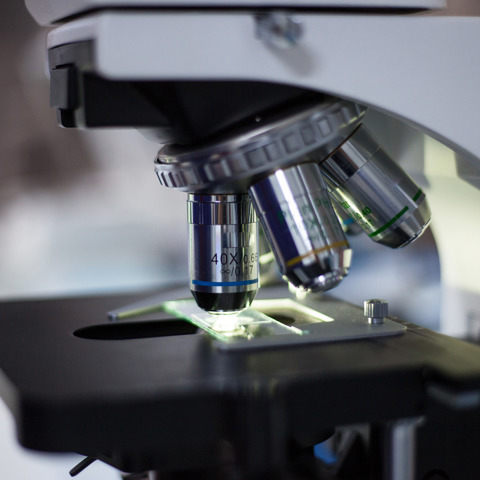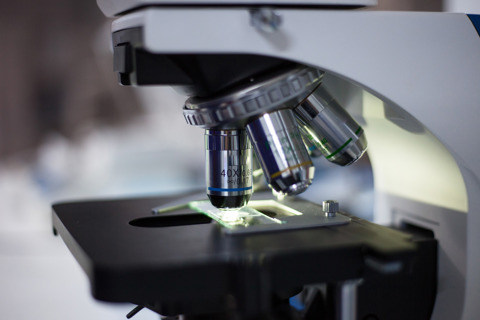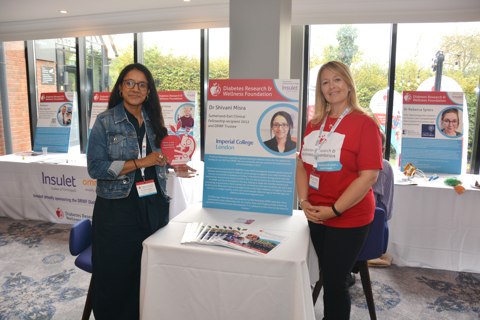
DRWF and the future of diabetes research
In 2021, we celebrated the 100th-year anniversary of the discovery of insulin, a landmark moment for the millions of people living with diabetes who have benefitted from the discovery ever since.
Over the past century, our understanding of the causes, prevention and management of diabetes has resulted in remarkable breakthroughs in technology and treatment methods.
Every year, medical researchers and institutions across the world continue to research diabetes, moving us closer to a cure.
Since our inception in 1998, DRWF has aimed to raise awareness of and find a cure for diabetes. We have committed more than £13 million to diabetes research in the UK and around the world, as part of the international Diabetes Wellness Network.
Research funded by DRWF is helping advance our understanding of diabetes and its complications.
Our support of islet cell research and transplantation has made a life-changing difference for a small number of people living with type 1 diabetes.
We aim to continue supporting ambitious and exciting research projects as part of our vision for a world free of diabetes, whilst helping to develop the next generation of diabetes researchers.

Supporting pioneering research
In 2023, DRWF reported on a pioneering clinical trial taking place in Oxford with Vertex Pharmaceuticals Incorporated. The VX-880 trial is designed to help people at risk of severe hypoglycaemia (low blood glucose levels) and is being led by Professor Paul Johnson, who is currently serving as Director of the Oxford Islet Transplant Programme and the DRWF Islet Isolation Facility.
The trial is the first of its kind in the UK that involves the transplantation of pancreatic islets derived from stem cells into patients with type 1 diabetes.
The trial is designed to help people living with type 1 diabetes who have developed difficulties in recognising the signs of hypoglycaemia and experience continued severe hypoglycaemia.
Hypoglycaemia happens when blood glucose levels become dangerously low. Sometimes, a person living with diabetes can be unaware of the usual symptoms of hypoglycaemia, which can lead to hospitalisation and can be life-threatening.
In July, Vertex announced positive results from its ongoing trial of VX-880, showcasing the potential of the treatment for people who struggle with glucose control.
In their latest report, Vertex revealed that all patients had no severe hypoglycaemic episodes and had improved glycaemic control, achieving targets for both HbA1c (below 7.0%) and time-in-range above 70% on continuous glucose monitoring.
The DRWF Connection
The trial is taking place at the Islet Transplant Unit in Oxford. In 2004, DRWF made an unprecedented £1.2 million award to the Nuffield Department of Surgery, Oxford for the provision of a Human Islet Isolation Facility, housed within the renowned Oxford Centre for Diabetes, Endocrinology and Metabolism (OCDEM) at the Churchill Hospital.
Since then, DRWF has funded around 30% of the facility staff, committing almost £4 million in total to furthering the non-clinical research element of the Oxford Islet Transplant Programme.
Professor Paul Johnson, Director of the Oxford Islet Transplant Programme and the DRWF Islet Isolation Facility, and UK Chief Investigator for this trial, said: “Islets derived from stem cells offer the potential for an unlimited source of islets that could be a game-changer and transform the future treatment of diabetes.”
Professor Johnson added: “We are very excited about this groundbreaking trial with Vertex, which we are conducting in collaboration with the team in Newcastle. While islet transplantation is a life-changing treatment in patients with severe hypoglycaemia who have exhausted conventional insulin and pump treatment, it relies on the extraction of insulin-producing ‘islets’ from donor pancreases.

The shortage of pancreas donors, and the inefficiency of the islet extraction process, currently limits the wider availability of this important treatment. We hope that this trial will be an important step towards our ultimate goal to be able to reverse diabetes in children soon after diagnosis.”
Supporting young researchers
Since our inception in 1998, DRWF has a long-standing history of supporting the work of upcoming researchers in diabetes.
Last year, two previously DRWF-funded researchers and one of our Research Advisory Board members received a share of a £5 million funding award from the T1 Grand Challenge programme.
Our success stories
Dr Shivani Misra has been working with DRWF for more than a decade, after becoming the recipient of a DRWF three-year Clinical Fellowship in 2012. In 2017, Dr Misra won the International Diabetes Federation Europe Prize for young researcher for her MY DIABETES study.
The study focused on classifying types of diabetes in people with young-onset diabetes from different ethnic groups, to investigate whether ethnicity has an impact on diabetes presentation and type. One of the key findings from the study was the discovery that genetic forms of diabetes are being misdiagnosed in people from ethnic minority groups.
In 2018, Dr Misra was named in the Evening Standard 1,000 health influencers for her work on the misdiagnosis of thousands of patients due to misconceptions about the role of ethnicity and diabetes. She also received the Outstanding Educator Award at the 2021 Quality in Care Diabetes awards for her MY DIABETES study.
More recently, Dr Misra was part of the clinical team developing the world’s first care programme aimed at supporting people aged 18–39 who have been diagnosed with type 2 diabetes.
T2Day: Type 2 Diabetes in the Young will offer people diagnosed with type 2 diabetes aged under 40 access to one-to-one reviews with healthcare professionals, as well as the option of new medicines and treatments where indicated, to improve management of their condition.
There will also be dedicated support available for women, as there can be additional risks associated with the condition during pregnancy, including access to contraception and folic acid supplements.

Current Pump Priming projects
Every year, DRWF hosts an annual funding programme designed to support bright young researchers, as well as established institutions, as they strive to make the kind of life-changing breakthrough our diabetes community is hoping for.
Our Pump Priming grants are small project grants which provide a steppingstone for young and talented researchers who are interested in diabetes. Our research strategy aims to invest in these future innovators who will play a pivotal role in advancing our understanding of diabetes in the future.
In March 2024, the UK government announced a further £45 million funding package for charity-funded early career researchers. This package will support the work of more than 1,000 early career researchers who are funded by 89 medical research charities, including DRWF.
Three of our current funded researchers will be attending our annual wellness and education event, United Through Diabetes, where experts from across the diabetes community will share their knowledge, expertise and the very latest news about diabetes.
Dr James Russ-Silsby from the University of Exeter is exploring how beta cells function and develop. His study will focus on individuals with rare types of diabetes caused by a single genetic defect, allowing him to look at what happens when a single pathway is broken, offering a window into the broader functioning of beta cells.
The study will mainly focus on the rare form of diabetes called transient neonatal diabetes mellitus (TNDM). TNDM is diagnosed in babies who are unable to produce enough insulin during their development before birth and in early life. Uniquely, these children temporarily regain the ability to produce enough insulin in childhood but are then re-diagnosed with diabetes later, usually in adolescence or early adulthood.
Dr Steven Millership from Imperial College London will investigate a large number of commercially available compounds that target epigenetic pathways known as “epidrugs” and assess their ability to enhance human beta cell maturation in a cellular model system.
Dr Millership aims to understand the role that these novel epigenetic pathways have on beta cell functional maturation and ultimately to assess their ability to enhance the functionality of stem cell-derived beta cells prior to transplantation into patients living with diabetes.
Dr Adaikala Antonysunil from Nottingham Trent University is currently looking at B12 deficiencies in pregnancy. Dr Antonysunil proposes that when B12 levels are deficient, the methyl groups normally added to the microRNA, which control genes and cellular process, are reduced. This results in dysfunctional microRNAs which could profoundly change gene/protein products and contribute to disease development.
The aim of the study is to characterise the methylation sites and identify the gene targets of microRNAs at the tissue level caused by low B12, using advanced technologies.
Read more about DRWF-funded Pump Priming researchers here
I would like to make a regular donation of
I would like to make a single donation of
There are lots of ways to raise money to support
people living with all forms of diabetes.
Bake, Swim, Cycle, Fly ... Do It For DRWF!
Fundraise with us
Recent News


